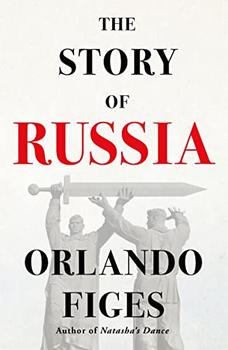Summary | Excerpt | Reviews | Beyond the Book | Readalikes | Genres & Themes | Author Bio

Kievan Rus emerged as the Khazar state declined. The growing military power of the Rus enabled them to free themselves from paying taxes to the khaganate; it also allowed them to assume the latter's role as the protector of the northern borders of Byzantium, a role which brought them rich rewards in the form of trade concessions in Constantinople, the Byzantine capital. As their power grew, the Rus warriors attacked the Khazar tribute-paying lands between the Volga and Dnieper. In 882 they captured Kiev, which became the capital of Kievan Rus.
Under the first Rus princes Kiev developed into an important trading centre between the Black and Baltic seas. In the Podol district of the city archaeologists have found large quantities of Byzantine coinage, amphoras and the weights of scales, as well as the remains of log houses built in a technique (without using nails) associated with the Russian north. To grow the population and tax base of the new state the grand prince Vladimir forcibly transported entire Slav communities from the northern forests to the regions around Kiev. It was the start of a long tradition of mass population movements enforced by the Russian state.
Establishing their power-base in Kiev entailed two important changes for the Rus. First there was a shift in focus from long-distance trade to the business of collecting tribute, from which they had seen the Khazars thrive. Lands once controlled by the khaganate were now taxed by Kiev, which built forts and towns to protect its dominion of the western steppe. Secondly, the main flow of trade moved from the Volga and the Muslim world to the Dnieper and Byzantium. This turn to the south was consolidated by a series of commercial treaties between Kievan Rus and the Byzantine Empire. Each was preceded by a Rus attack on Constantinople whose aim was to force the Byzantines to open up their markets and improve the terms of trade. The first of these treaties, in 911, made generous concessions to the Rus traders.
Through trade and diplomacy pagan Rus was drawn into the Christian civilisation of the Byzantine Empire. Princess Olga, who reigned as a regent of Kievan Rus between 945 and 960, led the way. She had herself baptised in Constantinople, where she cemented a military alliance with the emperor by adopting for herself the same name as the reigning empress Helen (Elena in Russian). Her son Sviatoslav remained a pagan, but her grandson, the grand prince Vladimir, had not just himself but all his realm converted to the Eastern Orthodox Church in 988.
According to the Primary Chronicle, Vladimir's conversion was the outcome of his search for the True Faith. The story goes that he was visited by representatives of the neighbouring states, each one seeking to convert him to their religion. First came the Islamic envoy of the Volga Bulgars, who enticed Vladimir with promises of carnal satisfaction in the afterlife (this was a man who, according to legend, had 800 wives), but put him off entirely with the Muslim ban on alcohol ('Drinking is the joy of the Rus. We cannot live without it,' the prince declared). Next came the German papal emissaries, followed by a Khazar delegation of rabbis (the Khazar leaders had embraced Judaism during the ninth century). Neither impressed Vladimir. Finally the Byzantines arrived. Their arguments persuaded him to send his envoys to observe the various faiths in their own environment. Among the Volga Bulgars they found only 'sorrow and a dreadful stench'. In Germany they 'beheld no glory'. But in the Hagia Sophia of Constantinople, 'We knew not whether we were in heaven or on earth,' they reported on the liturgy in the basilica, 'for surely there is no such splendour or beauty anywhere on earth. We cannot describe it to you. We only know that God dwells there among men. For we cannot forget that beauty.'
Like the rest of the Primary Chronicle, the story is apocryphal. Vladimir's conversion had more to do with statecraft and diplomacy than with the aesthetics of religious rites. The acquisition of a single, unifying religion could help to legitimise the Kievan state and extend its authority throughout its multi-ethnic territory, where various beliefs and pagan cults militated against princely rule. The existence of a readily translated Church Slavonic literature – enabling the dissemination of its teachings over a large area – gave the Orthodox Christians a clear advantage over other religions whose scriptures were not yet in Slavonic. The key factor here was the work of the brothers Cyril and Methodius, the ninth-century missionaries sent by the Byzantine emperor to spread Christianity among the Slavs. They had translated the Greek Gospels into the Glagolitic script (an early version of Cyrillic, named after Cyril by his followers). This had made it possible to have a Christian service in the Slavic tongue rather than in Greek, which the population did not understand.
Excerpted from The Story of Russia by Orlando Figes. Copyright © 2022 by Orlando Figes. Excerpted by permission of Metropolitan Books. All rights reserved. No part of this excerpt may be reproduced or reprinted without permission in writing from the publisher.




Finishing second in the Olympics gets you silver. Finishing second in politics gets you oblivion.
Click Here to find out who said this, as well as discovering other famous literary quotes!
Your guide toexceptional books
BookBrowse seeks out and recommends the best in contemporary fiction and nonfiction—books that not only engage and entertain but also deepen our understanding of ourselves and the world around us.